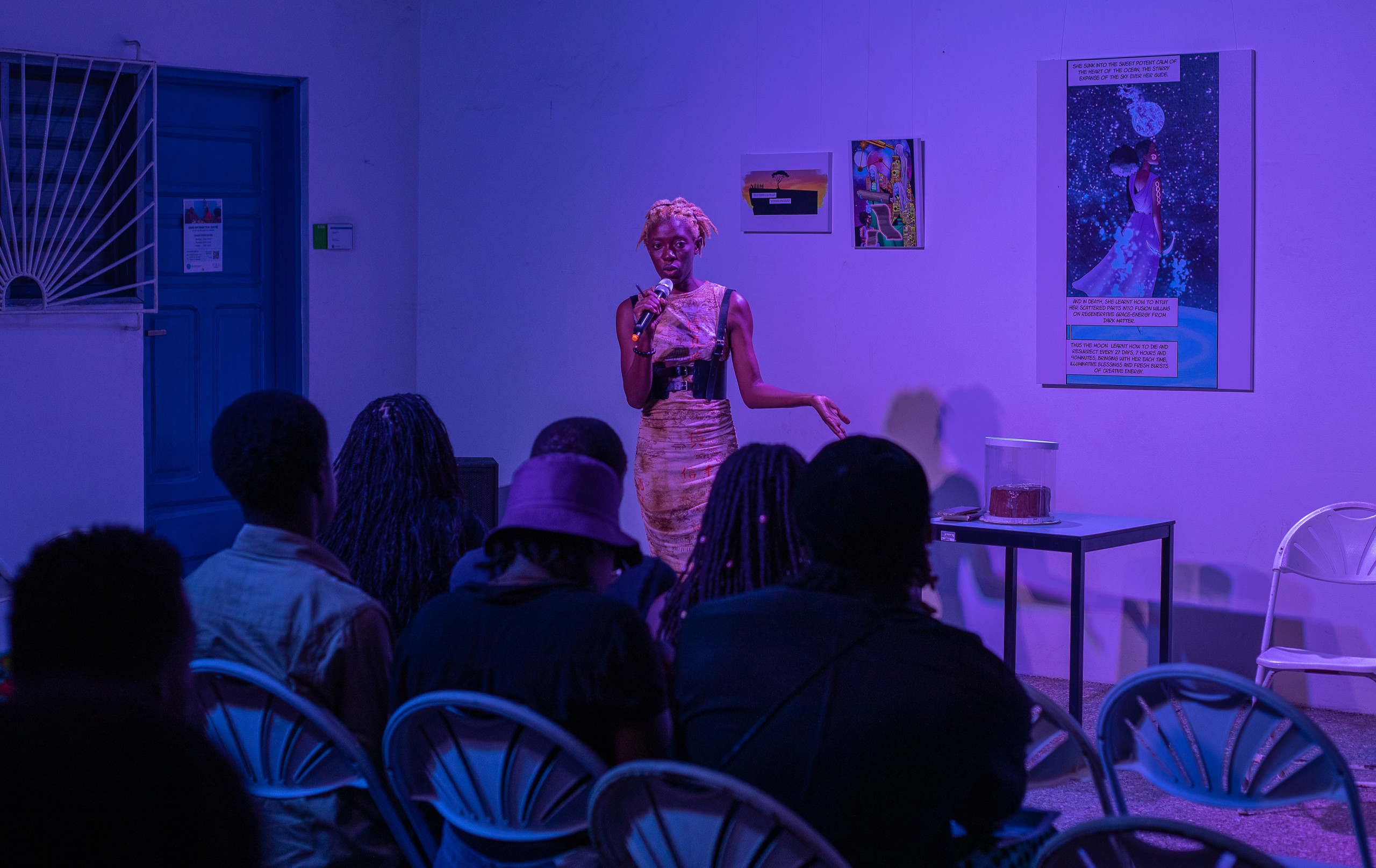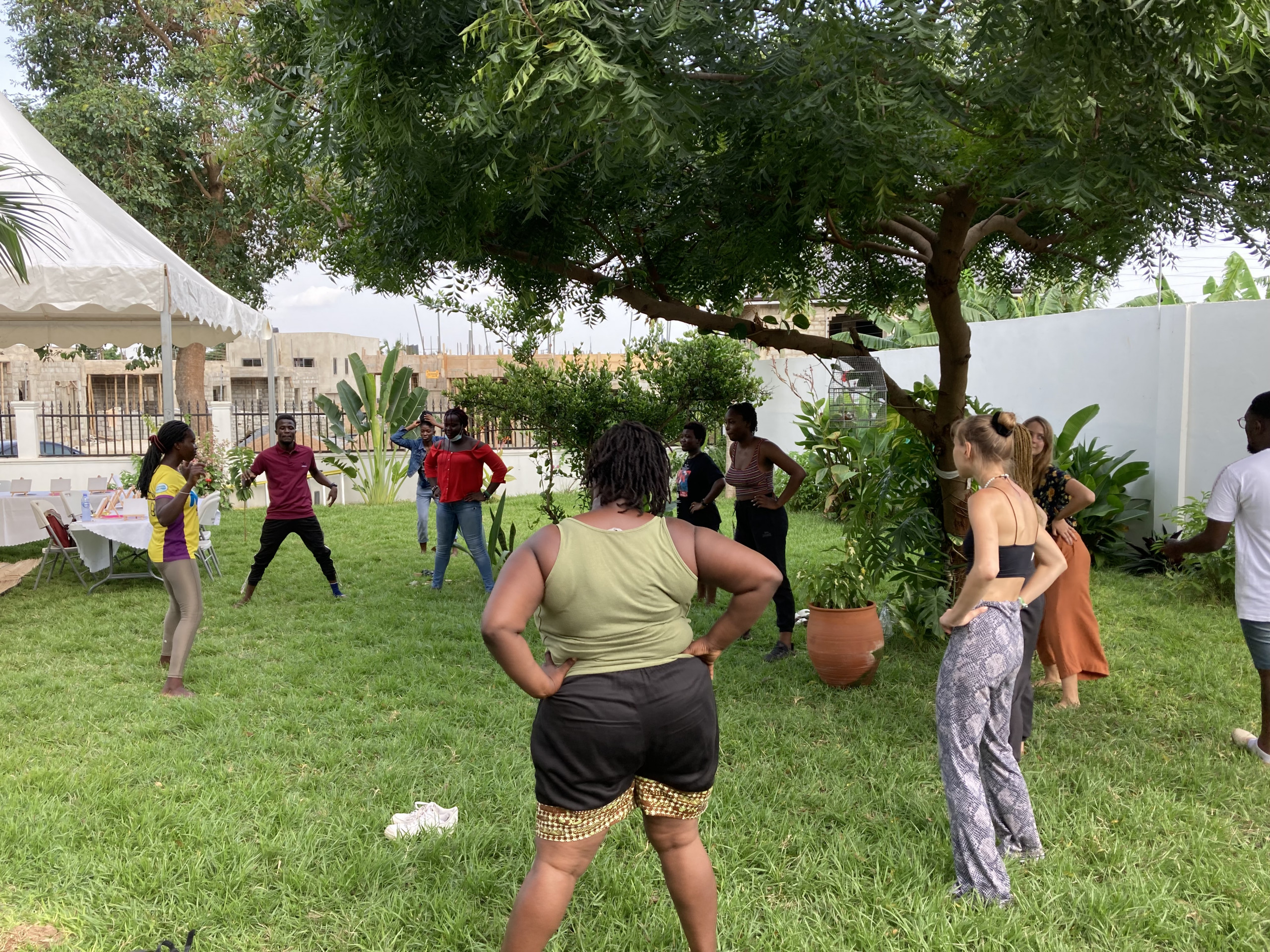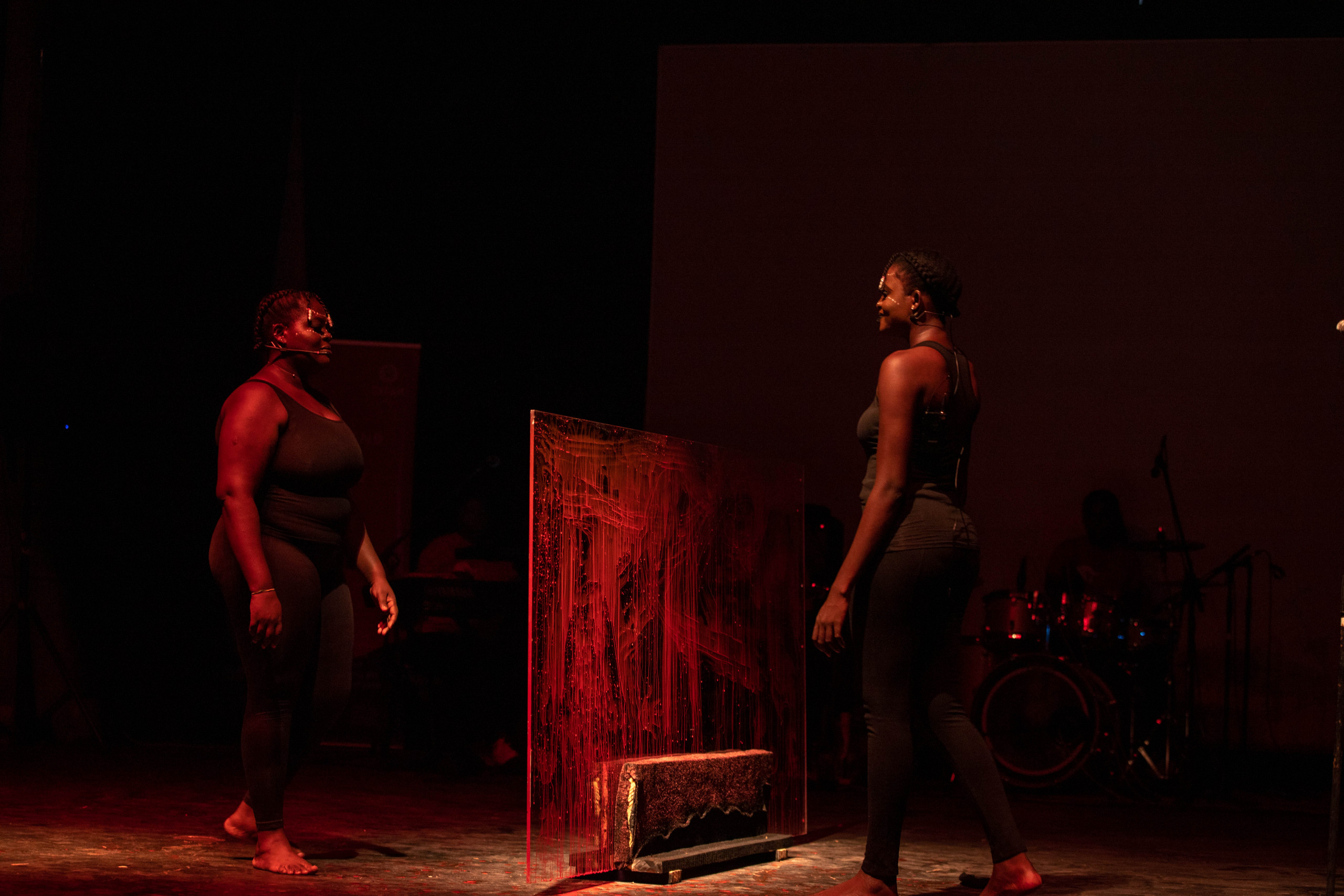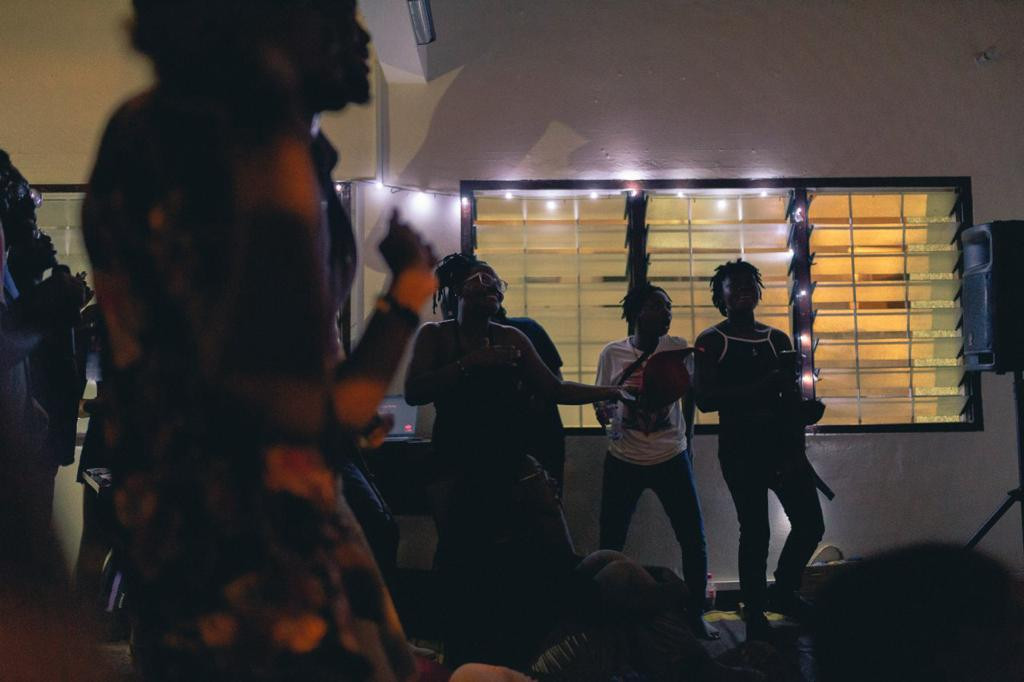Spaces of Collective Learning, Relearning and Unlearning
April 2, 2024
Accra, Navigating Friction
April 2, 2024
Accra, Navigating Friction

W’AHU: Let’s start right away with some introductions! Who are you? And what is Drama Queens?
Owuraku: All right, my name is Owuraku, I am the co-director of Drama Queens together with Michaella. Drama Queens is a Feminist, Pan Africanist and Queer youth-led nonprofit. So basically it’s a collective of young people who are very passionate about arts and social change, using arts to centre the narratives around women and queer folks through theatre, film documentaries and any creative means necessary.
Michaella Gyatsen: I am the other co-director, my name is Michaella. I’d add that the thematic areas that we cover in our artistic activism are centred around bodily autonomy, consent culture, queer liberation, ecological justice, equal accessibility or radical empathy – that kind of stuff…
W: Given the current situation with the ‘Human Sexual Rights and Family Values’ bill being debated in Ghana’s Parliament, it seems that the concept of a queer community is something that has almost gone mainstream. 1Since this interview was conducted, Ghana’s parliament voted to pass the anti-LGBT bill in February 2024. As of April 2024, it is currently still awaiting validation by the president before becoming enshrined into law. With that in mind, what do you think are the most common stereotypes associated with the queer community in Ghana, and what are the main forces pushing these stereotypes?
O: I identify as a non-binary person so I’m having to experience the anti-LGBT climate in Ghana first-hand. I would say there are a lot of stereotypes, many of them are misconceptions being used to fight against the queer community in order to pass the bill. There are politicians feeding some of these stereotypes, and the media has also not been helpful in fostering honest open dialogue with people who are experiencing this violence.
MG: The anti LGBT or anti-gender sentiment in Ghana is not a coincidence – there are people actively cultivating it. A huge part of that is because of colonisation, and the social and cultural influences that were pushed on us. But personally what’s worse is the lingering effect that colonisation has: we’re seeing a regression of kindness and empathy happening in real time, and that’s very troubling. You can’t put all of the blame on the colonial powers when you have people in Ghana in 2023 actively fuelling these sentiments. There are multiple layers to all of it: it’s a matter of where you stand and your access to power, and how that relates to other people who might not have that level of power.
W: What are some of the projects that you have organised in which you try to challenge these narratives?
MG: Even before we get into specific projects, I think our entire existence is rebellion against the system and the way things are progressing. Because just by existing on social media, just by existing in our spaces and just by gathering people together along the principles that we believe in, we are giving a big fuck you to the current Ghanaian system. The second level is that we are very deliberate about creating safe spaces so it doesn’t matter what or where our event is, everyone can be in that space and exist and express their opinion, even when their opinions don’t have anything to do with how they identify. Maybe Owuraku can continue with some more specific instances of community organising.
O: Our programming centres around performing arts, producing zines, conceptualising conversations, commissioning music and also making documentary films and theatre productions. Moon Girls is one of our favourites, a graphic novel that follows four African super-sheroes fighting against the system and trying to create social change. Using art means we are able to document queer history and queer realities, making sure that we’re able to tell our own narrative and stand up to violence. There have also been femme gatherings, for women and gender nonconforming or gender-expansive people, where they can speak about different things that affect them, where they can meet other young queer women and even straight-cis-women in that same space.
MG: If I may come in? Sometimes we’ve had to work with people who do not necessarily associate with or advance queer liberation, but that is a them problem to be honest. When we are planning or conceptualising a project we give priority to members of minority groups leading the projects, and at the end of the day queer people are represented in the project and influence how it should run. So the end result might not look like all rainbows and sparkles – it’s more about the thought and the energy behind organising whatever we are doing.
W: We were lucky to have been present at one of your events a few months back, and as you mentioned Michaella, the fact that you created this moment of security and safety for your community was really amazing to witness. On one hand you create these moments where people can be themselves, but on the other you also do a series of projects geared towards changing other people’s perspectives. Are these always separate types of events, or is there a more fluid approach?
O: Language is very important so it is very incumbent on us to be intentional in how we engage with other people and what kind of thematic areas we are trying to organise in so that we’re not just creating safe spaces for queer people, but we are also learning together. We are having these conversations together and holding people accountable together to make sure it’s a safe space for the next person.
MG: I think it is just as important to encourage spaces of collective learning, relearning and unlearning. Just because a lot of our audience are queer does not always equate to knowing better or doing better. To answer your question directly, there’s not such a difference between our projects, it’s very fluid…
W: One of the main themes that we’re interested in exploring is the idea of visibility. Could you expand on how you decide if a work should be seen by a wider audience or focused more inwardly towards your community? How do you navigate this considering the increasingly difficult political climate?
O: I appreciate visibility for minority or marginalised communities. When the anti-LGBT bill came in though, it arrived with a new set of challenges. There have been some instances where partners did not want us to host a queer event in their space, or we encountered some form of administrative terms and conditions that we couldn’t agree to without saying that queer people should be minimised. So visibility is a part of our conversation, up until the point where it is safe for you. At the end of the day more violence is being done to queer people who are living their authenticity.
MG: We believe that everyone, regardless of how you are perceived or express yourself, should have access to things that other people have access to, but all of this is within the context of the personal and collective security of the people involved and attending our events. We don’t shy away from expressing the things we believe in…that trans-women are women, that disabled people deserve accessibility, that everybody needs economic justice… We don’t shy away from those things, or from how ecological or climate change is a feminist issue that disproportionately affects marginalised women… We say these things in the context of the spaces we curate, in a way that is safe for the people that are going to be associating themselves with us. We would like to be more visible because we want even more people to have access to the community and resources that we can offer – but that’s something that you’re not always able to do because when you’re balancing security, visibility and access, balancing also becomes an issue of money. If you don’t have enough money you can’t pay security staff for an event for a hundred or two hundred people, so you have to cut guest lists–even finding a venue is expensive.

W: To understand the shape that some of these events take, could you expand on the role of art and creativity for Drama Queens?
O: Art is an important part of trying to connect with another human being, it carries a lot of messages and a lot of storytelling. We are collectively conscious of narratives so that we can begin to change them As queer activists in Ghana fighting against this anti-LGBT bill, we realised that the kinds of violence or the kind of systems that we have to change go beyond just legal: we are fighting to help change the narrative.
MG: Another reason why art is important to us is because art is something that can go under radar – like Owuraku said, art connects with people on an emotional level. When something connects with people on an emotional level, it enters their consciousness, and before they do anything, they feel differently about certain things that they might have not thought about before. As well as vibing on an emotional level, it’s something that we enjoy doing, so we face less fatigue, because an activist’s work can be very hard. Doing something that is visually appealing or good to the ears provides instant gratification that motivates you even more to keep doing what you’re doing. Still, sometimes the impact of art-based activism is not always direct, or not always so easy to see.
W: Do you have an example of those more subtle outcomes?
MG: A perfect example is in the process of writing or directing a play. When we’re working on a production, we are directing it with the intention that the audience will learn something, be moved–all our plays are very political. But also, the process of direction and rehearsals includes a lot of conversation and learning. For example, last December we did a play where we had to break down the word “female” and how it is not always such a good word to use because of its historical connotations and because of how anti-gender movements are appropriating it today. The actress didn’t immediately understand. It took multiple sessions where Owuraku and I joined the director and the cast to have conversations about it. By the day of the production, the actress had come to an even deeper understanding of what language can look like and what language can mean to the people who it is being used against. That difference could be seen in the production.
W: It’s good to hear about the time and care that goes into a production like that. What kind of response do you get from your audience?
MG: It’s very common that audiences are uncomfortable, and that’s okay, that’s fine. You should be uncomfortable because when you’re uncomfortable, you are one step closer to thinking about why you’re uncomfortable. And once you start to think about why you are uncomfortable, you start to question things and seek deeper understanding.

W: It was clear from the Drama Queens event we attended that there’s a general sex-positivity or openness in what you do. Could you expand on this?
O: I would say there’s a humility in Ghanaian culture that forces you to be timid and modest, not expressive. Yet when you are young, you’re probably having sexual conversations in your head already. It’s quite imperative in creating this community for us to be able to engage in those conversations.
MG: The openness around sex in the DQ community is something we’re pretty proud of. It comes from us creating a safe space to make people feel able to put down their mental walls. Ghanaians we have plenty problems… so it’s great that people can find instances where they don’t have to feel so oppressed and can express themselves, even for a few hours.
W: So how do you foster this more officially through Drama Queens programming?
MG: One way that we encourage informed decisions is through our ‘Let’s Talk Consent’ workshops that are structured mainly around boundaries and gender theory. Another thing with the Ghanaian system is that whenever people talk about sex education–especially for young girls and just younger adults–it’s all about abstain, abstain, abstain. It’s never really about the choices or the options you have, or about taking accountability for respecting or expressing boundaries. So something that is really cool about Drama Queens is that in our own small way–actually in a very big way, I should blow our own horn–we provide opportunities and resources for learning so that we can make better decisions.
W: It’s great how you manage to merge different levels of engagement with the community, from the creative and artistic output, to, sharing information around health and education, and….
MG: …and parties!
W: And parties?
MG: We throw some of the best parties here!

This text is an edited version of a longer interview first published in W'AHU Magazine, where Drama Queens held the role of Contributing Editors.